Explainer | Why is the Georgian government comparing protesters to Naruto’s Akatsuki?
Georgian Dream is notorious for its creative terms to describe its critics — but why is it using a term from the anime Naruto to describe protesters?
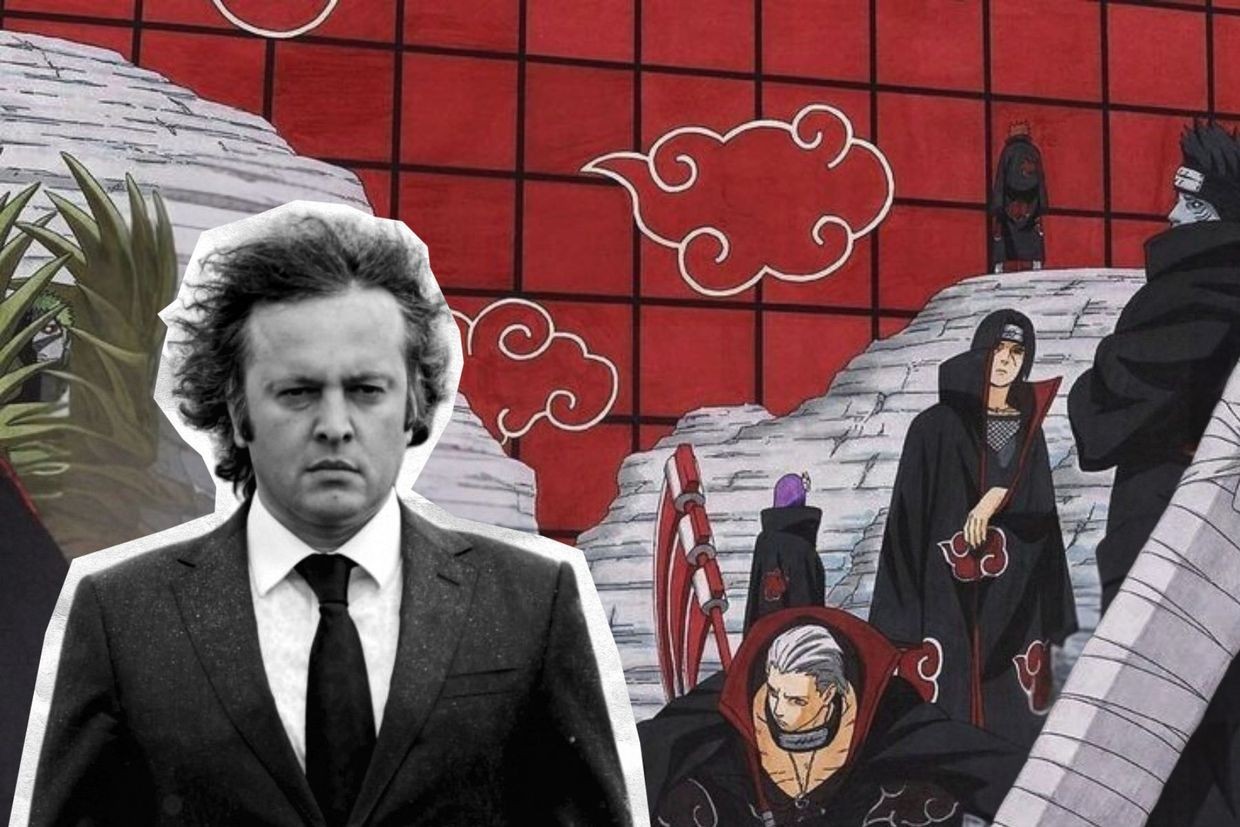
Georgian Dream’s conspiracy-tinged vocabulary has for years been the subject of mockery and concern amongst those watching Georgian affairs.
Among the most prominent talking points have been their repeated and unsubstantiated claims that a ‘global war party’ seeks to push Georgia to open a second front against Russia in its full-scale invasion of Ukraine and allegations that a ‘deep state’ is covertly controlling Western governments — including the US, where President Donald Trump is, according to Georgian Dream, still resisting their influence.
But perhaps the most outlandish so far is their recent uptake of the word ‘Akatsukebi’, a Georgianised plural version of the name Akatsuki, to refer to Georgian protesters.
Who or what is the Akatsuki?
Let’s be real, you don’t really come to OC Media for insight on anime, but for the sake of this explainer, we’re going to provide a brief Naruto lore dump.
The term Akatsuki comes from the immensely popular Japanese manga series written and illustrated by Masashi Kishimoto. The series is perhaps best known for its anime adaptation, Naruto, and its follow-up Shippuden.
In the series, the titular character, Naruto, is one of nine Jinchūriki, physical hosts of tailed beasts, which are massive physical manifestations of Chakra, a source of supernatural energy used to channel powerful fighting techniques. While in the world of Naruto, most ninjas have access to Chakra in variable degrees, none have reserves as large as a Jinchūriki.
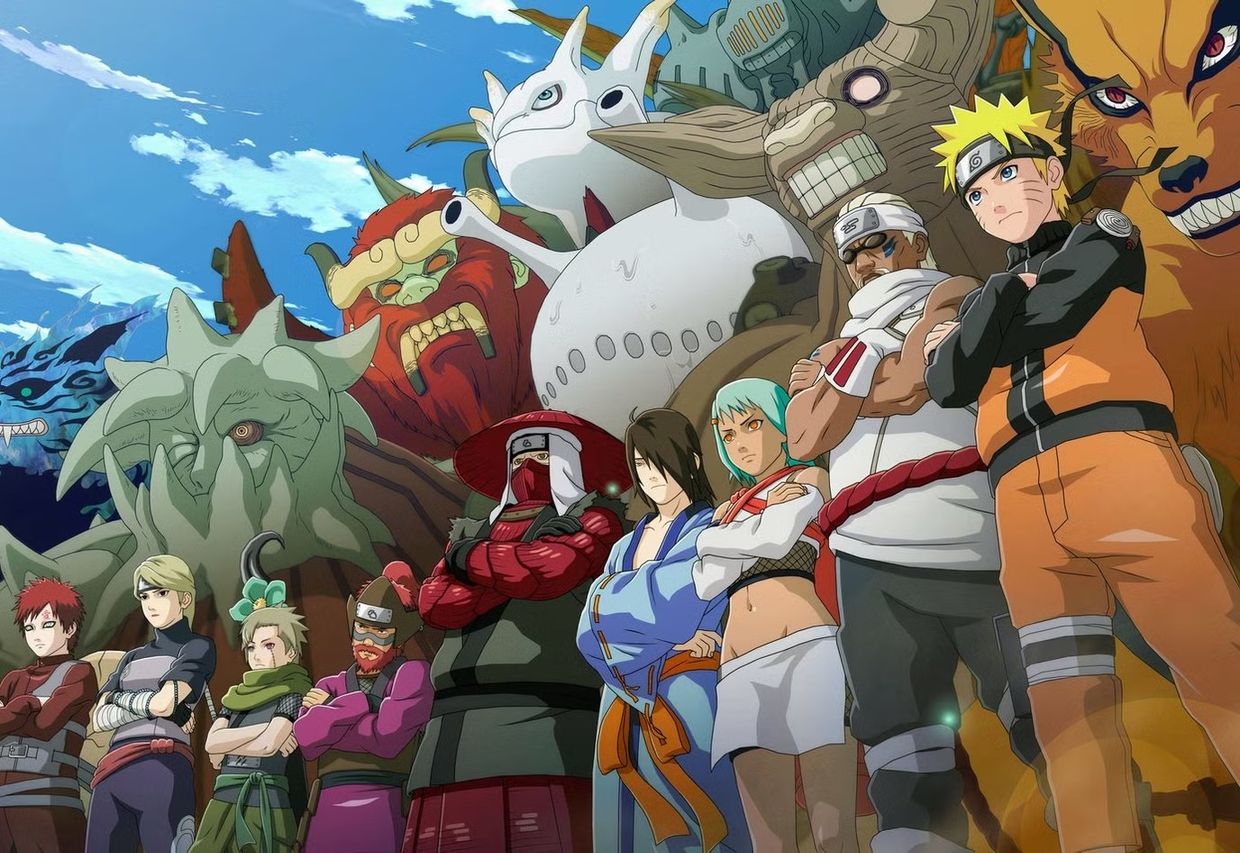
The Akatsuki are a shadowy terrorist organisation made up of a handful of rogue ninjas seeking to capture all the Jinchūriki to extract their tailed beasts, with the ultimate goal of achieving world peace through any means possible.
While initially being founded to combat the tyranny of Hanzo, the leader of their country, the group eventually resorts to various acts of violence and terror committed against other countries.
*Spoiler alert* Towards the very end of the series, we find out that the Akatsuki were in fact being controlled and manipulated behind the scenes by the real antagonist of the story, Madara Uchiha, who sought to enslave the entire world through the use of a powerful illusory technique. (End of spoilers)
An incomplete timeline of the term’s usage
The derogatory use of the term Akatsukebi by Georgian Dream, their propagandists, and their supporters appears to date back to 28 October 2024.
On that day, two days after the disputed elections which saw Georgian Dream retain power for an additional term, protesters and protest organisers took turns to give speeches on a stage set up in front of parliament.
That night, Mikheil Meskhi, a protester and activist from the western Georgian city of Kutaisi, took to the stage and declared: ‘Akatsuki is with you!’ — among other things.
‘Today, the Akatsuki are with you, Gondor, Rohan, Frodo Baggins, Harry Potter, Gryffindor, House Atreides, everything you read, whose ideals you were raised on’, he said.
His comment was picked up shortly after by one of the most prominent government propagandists, the founder of far-right and pro-Russian TV channel PosTV, Shalva Ramishvili.
As POSTV’s shareholder since its founding, Ramishvili has consistently attacked government critics, praised the ruling party, and echoed its narratives — including on foreign policy — sometimes going even further than Georgian Dream itself, such as openly claiming that Ukraine’s defeat in the war with Russia would serve Georgia’s interests.
On his talkshow, Samni & Co., Ramishvili and his co-hosts, Bacho Odisharia and Guri Sultanishvili, mocked Meskhi, picking apart the variety of pop culture references he had made during his speech. In one instance, Odisharia claimed that Meskhi had not read the books whose characters he mentioned and had only seen the films and animations based on them.
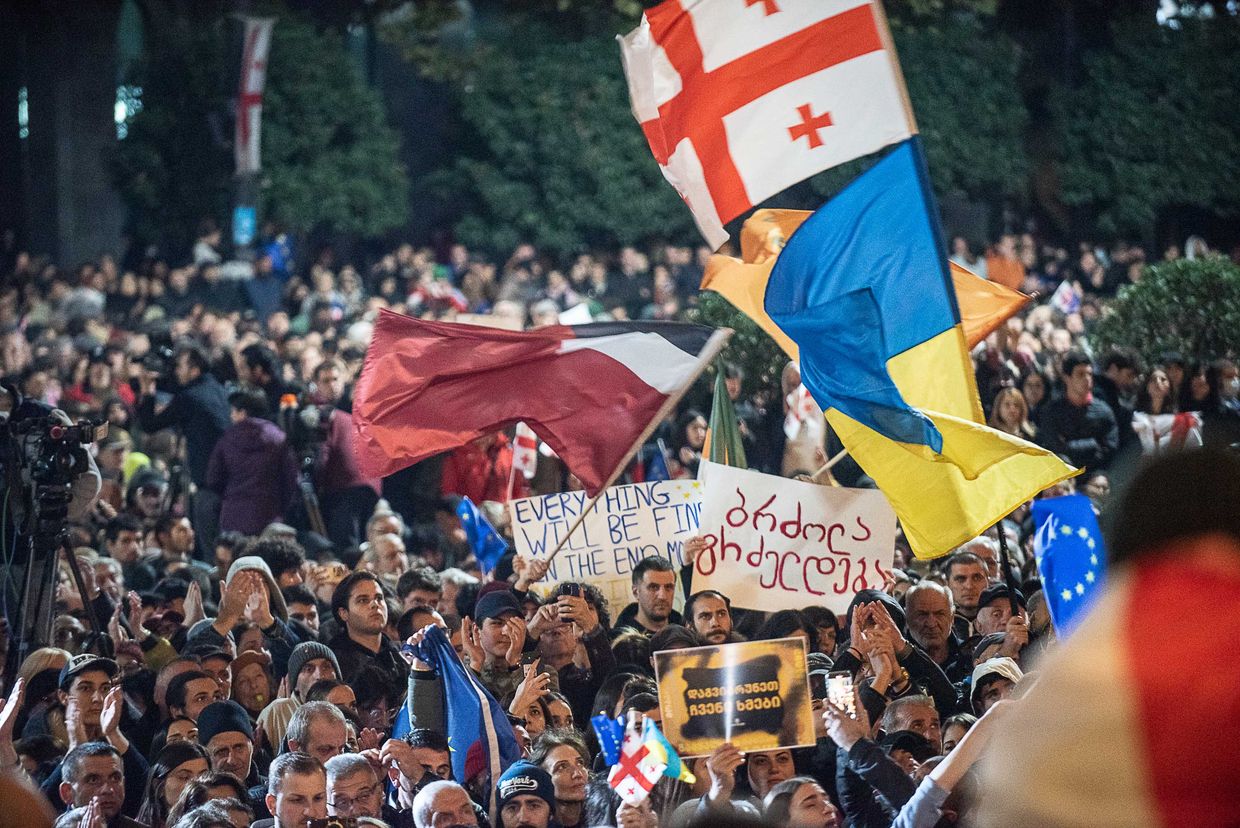
Based on this specific episode, it appeared that at the time, government propaganda knew little about the fictional organisation on which it later built an entire narrative: Ramishvili repeatedly asked the relatively young Odisharia to explain what ‘Akatsuki’ meant.
‘It’s something about ninjas in Naruto’, Odisharia responded.
A scan through popular social media platforms used in Georgia, such as TikTok and Facebook, have revealed that the term has been sporadically used to describe supporters of the opposition or protesters since at least November 2024.
However, the term appears to have picked up some steam after Georgian Dream officials began using it to refer to protesters. While the Georgian government is not the best at compiling statements made by high-ranking officials, pro-government media outlets Imedi and Rustavi 2 usually publish most remarks given by Georgian Dream figures.
The earliest mention of the term ‘Akatsukebi’ on both Rustavi 2 and Imedi’s websites dates back to 6 February 2025, from a statement by Tbilisi Mayor Kakha Kaladze, who referred to members of the opposition as ‘deep state’ agents.
‘The Akatsuki that we see here today in the form of politicians are ordinary, stateless agents’, Kaladze said at the time.
Kaladze has since gone on to mention this term in singular and plural forms at least ten more times so far, according to Imedi’s archives. On several occasions, he used the phrase ‘30 Akatsukis’, echoing Georgian Dream’s claim that only a few dozen people attend the protests.
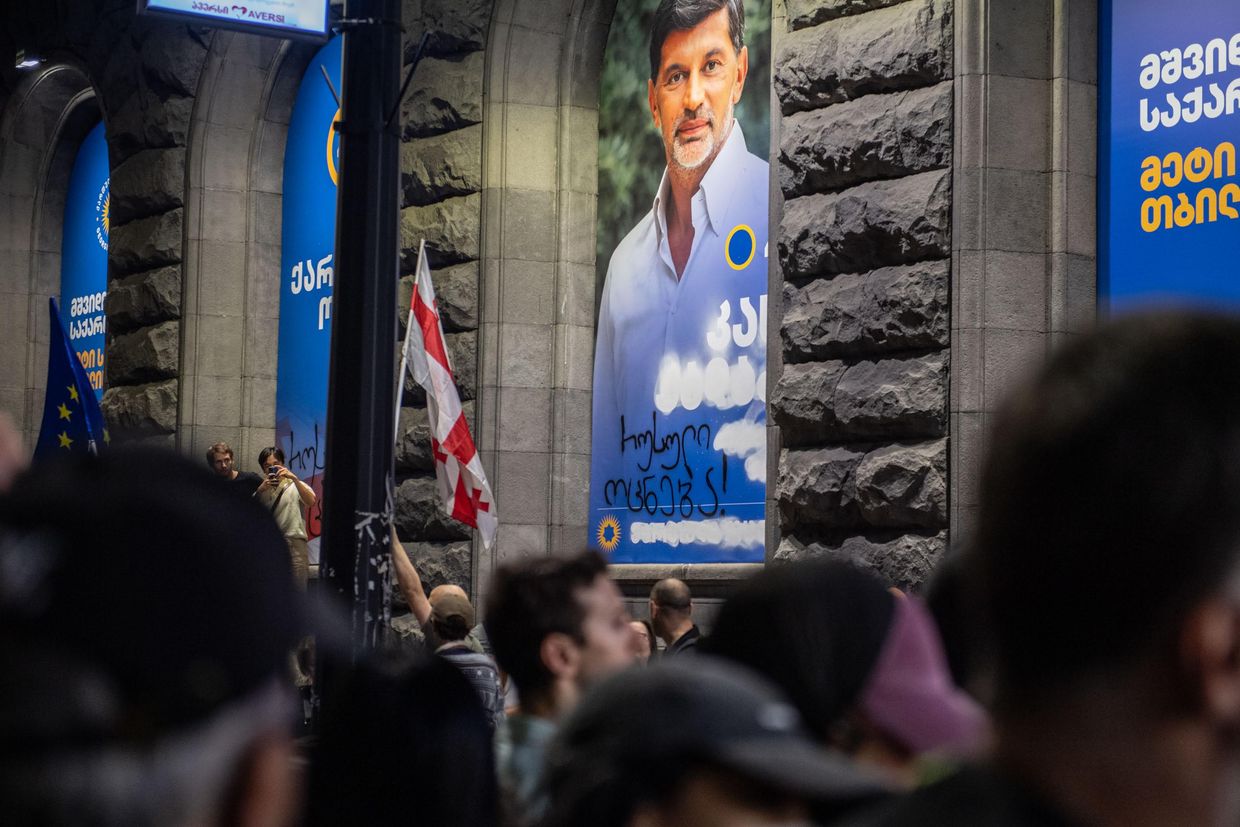
The next recorded use of the term after 6 February was found yet again on Imedi, who quoted conservative politician and historian Soso Manjavidze. On 6 May, Manjavidze dropped a bevy of Georgian Dream-approved slurs and terms in criticism of the MEGOBARI Act, a US bill that would empower Georgia’s opposition and sanction Georgian Dream officials.
‘NGO Tukus, old Trotskyists, toilet writers and artists, and various Akatsuki — their name is legion’, he said. ‘All of them are outspoken LGBTQ+ supporters’. The term ‘tuku’ has a rather convoluted definition, but loosely can refer to someone sly or cunning — or someone that massaged the genitals of the Shah or Sultan in the Persian or Ottoman empire.
Since then, both outlets have quoted several politicians as using the term, including Zurab Kagaidze and Davit Kartvelishvili, members of Georgian Dream’s satellite group, People’s Power, and Vato Shakarishvili, a member of United Neutral Georgia, another Georgian Dream proxy.
Kartvelishvili appears to have publicly used the term at least nine times between June and October 2025.
In turn, PosTV’s Odisharia is twice quoted by Imedi using the term. In the first, on 15 September 2025, the outlet wrote about a social media post of his in which he draws parallels between the Black Mirror episode ‘Fifteen Million Merits’ and the protest movement, claiming the protesters — the Akatsuki — are ‘trained and funded from outside by NGOs’.
Days later, on 18 September, Imedi highlighted another of Odisharia’s posts where he called the ‘Akatsuki’ a ‘modified copy of Antifa’. He praised Trump’s designation of Antifa as a terrorist organisation, saying the same should be done in Georgia.
‘The approach towards them should be the same as it is in their beloved Mecca of democracy and the country of freedom’, Odisharia was quoted as saying.
The term appears to have fully been integrated into Georgian Dream’s official rhetoric in early October 2025, when Prime Minister Irakli Kobakhidze, on 5 October, referred to the Akatsuki as an ‘extremist group’ that led the attempted storming of the Presidential Palace in Tbilisi on the eve of Georgia’s local elections the day prior.
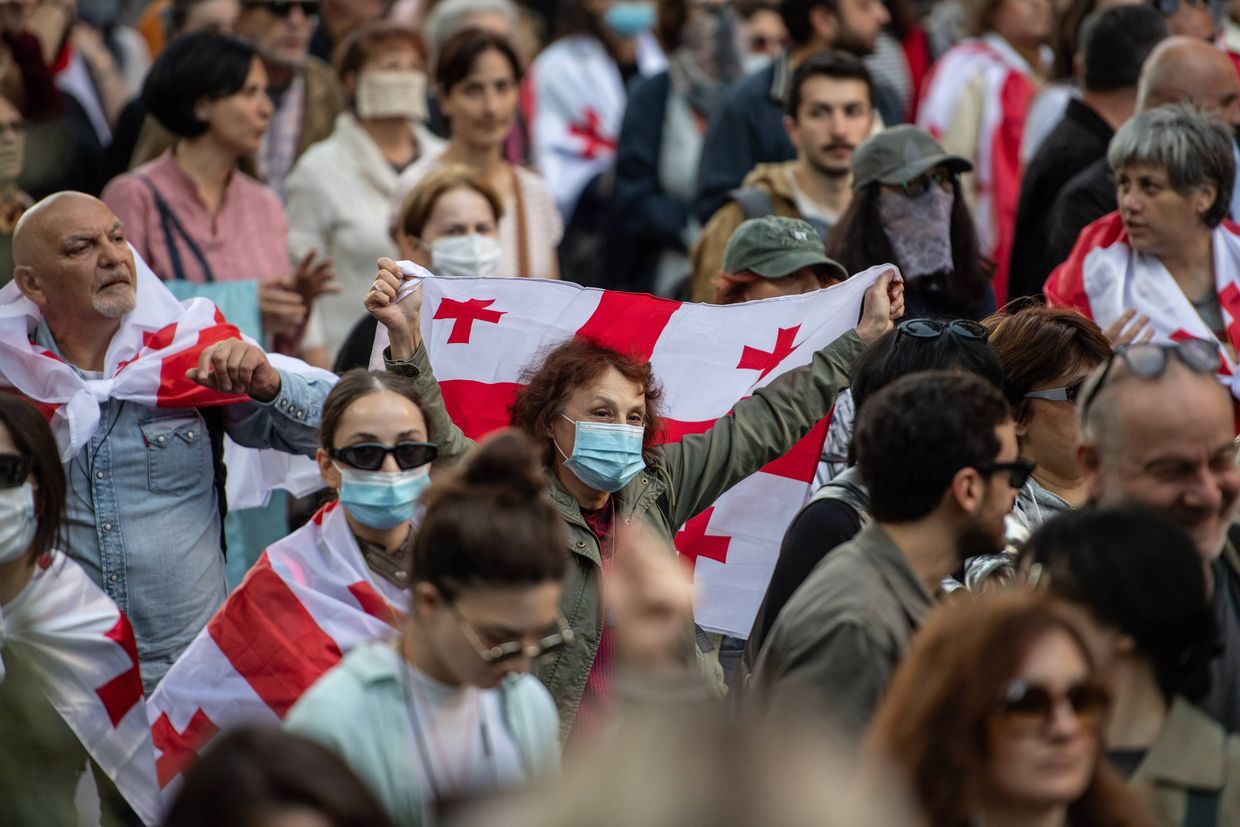
In the same address, he claimed that a 20-year-old Akatsuki peppersprayed pro-government journalists, likening the act to the 2007 raid of Imedi TV by the former ruling United National Movement party (UNM) and their takeover of Rustavi 2.
Later, in an interview with Georgia’s Public Broadcaster on 15 October, Kobakhidze referred to Finnish Foreign Minister and OSCE Chair-in-Office Elina Valtonen as a member of the Akatsuki for attending a protest and expressing her support for the anti-government movement.
‘Fifty so-called Akatsuki gathered at that rally, and Finland’s Foreign Minister showed up as the 51st Akatsuki, which is unimaginable’, Kobakhidze said.
Peaceful protestors have gathered in front of the Parliament Building in Tbilisi, Georgia, to voice their concern over the repressive direction of their country. They have every right to democracy, to freedom of expression and basic human rights.
— Elina Valtonen (@elinavaltonen) October 14, 2025
We are here to support them. pic.twitter.com/6axn6usXay
The Naruto-ification of Georgian politics
The emergence of the name Akatsukebi in Georgian Dream’s regular rhetoric has been met with ridicule and mockery on social media.
Meskhi, the protester who appears to have introduced the term to Georgian politics, said that he never imagined that mouthpieces such as Ramishvili would single him out out of thousands of protesters.
In conversation with OC Media, Meskhi, 28, said that he chose to reference popular or fictional characters as a way to reach younger protesters.
‘When I arrived at the protest, [the young people] were watching with deep distrust as the politicians spoke; probably using the same overused phrases from the past 10–15 years’, he said, adding that he wanted to show younger demonstrators that someone was ‘speaking their language’ too.
Meskhi added that he intended to challenge the perception of a generational divide amongst the protest movement, and to show that those who are critical of the government come from different age groups and backgrounds. That is why, he says, he also mentioned Merab Kostava — a symbol of anti-Soviet national liberation — alongside Gondor, Rohan, and the Akatsuki.
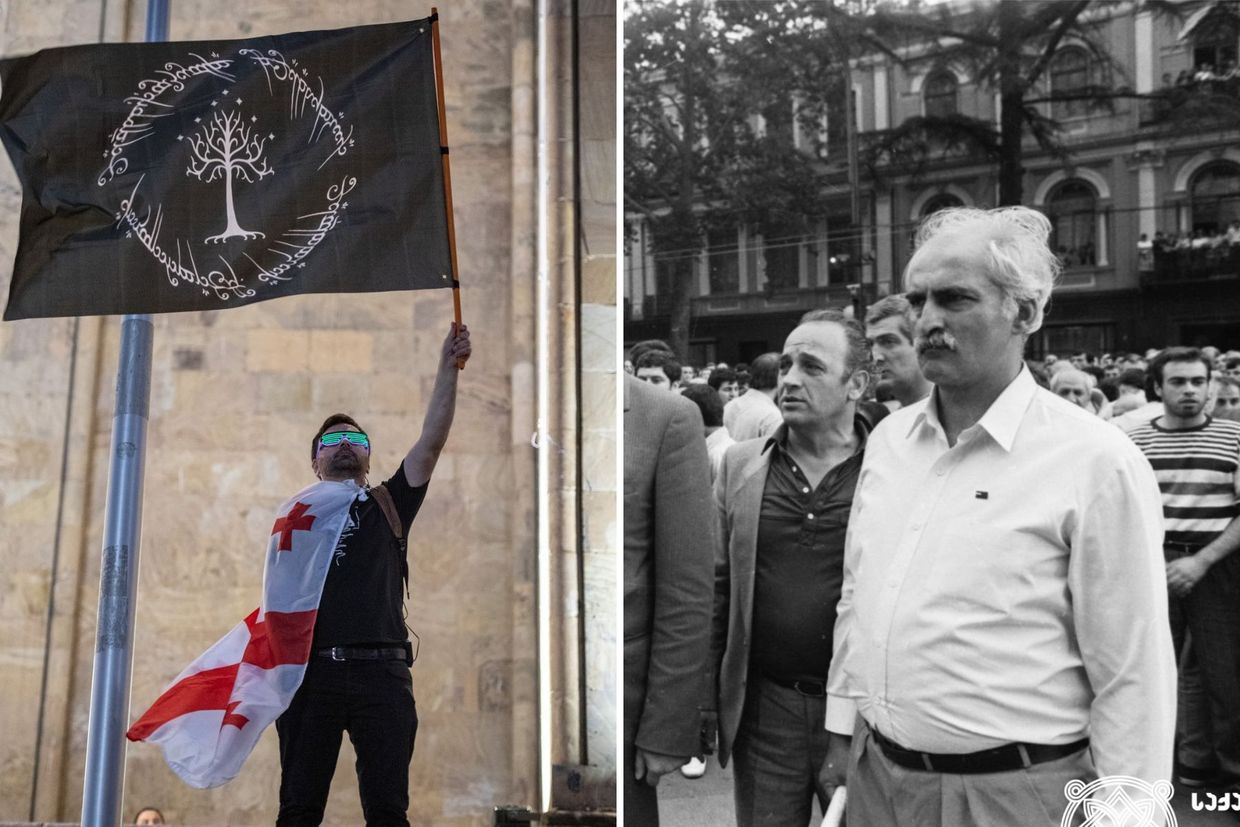
‘The idea was that we were raised on ideals that might come from books and our parents’ stories, but also from modern mainstream works’, he said.
Asked if he believed whether members of the ruling party or their associates understood the meaning behind the word Akatsuki, Meskhi stressed that Georgian Dream do not even endeavour to explain the term itself.
‘They don’t respect their own voters and think they will swallow any nonsense thrown at them’, he tells OC Media.
‘They [the Akatsuki] are anime antagonists who are actually idealistic and kind at heart, but because of manipulation, things change’, he explains. ‘My message was that we are peace-loving […] but if it happens that [the ruling party] takes the state from us, imprisons our friends and forbids us from breathing and moving, then life won’t be easy for them either’.
While Georgian Dream and their cavalcade of supporters and propagandists appear to have demonstrated some understanding of the role the fictional organisation played in Naruto, their use of the term continues to be one of the most bizarre episodes of Georgia’s ongoing political turmoil.
However, it still begs the question — in the Naruto-verse, who would Georgian Dream be? The Akatsuki, the Jinchūriki , or perhaps the tyrannical leader Hanzo, who rules the country with an iron first?




![Baia Margishvili standing in central Tbilisi with a sign reading: ‘The Prosecutor’s Office [is] a punitive squad. How many more innocent people will you put in prison?’ Photo: Mariam Nikuradze/OC Media.](/_next/image/?url=https%3A%2F%2Fassets.bucket.fourthestate.app%2Foc-media-prod%2Fcontent%2Fimages%2F2026%2F02%2Fcalls-for-sanctions-and-raids-19-10-25-48.jpg&w=3840&q=50)





